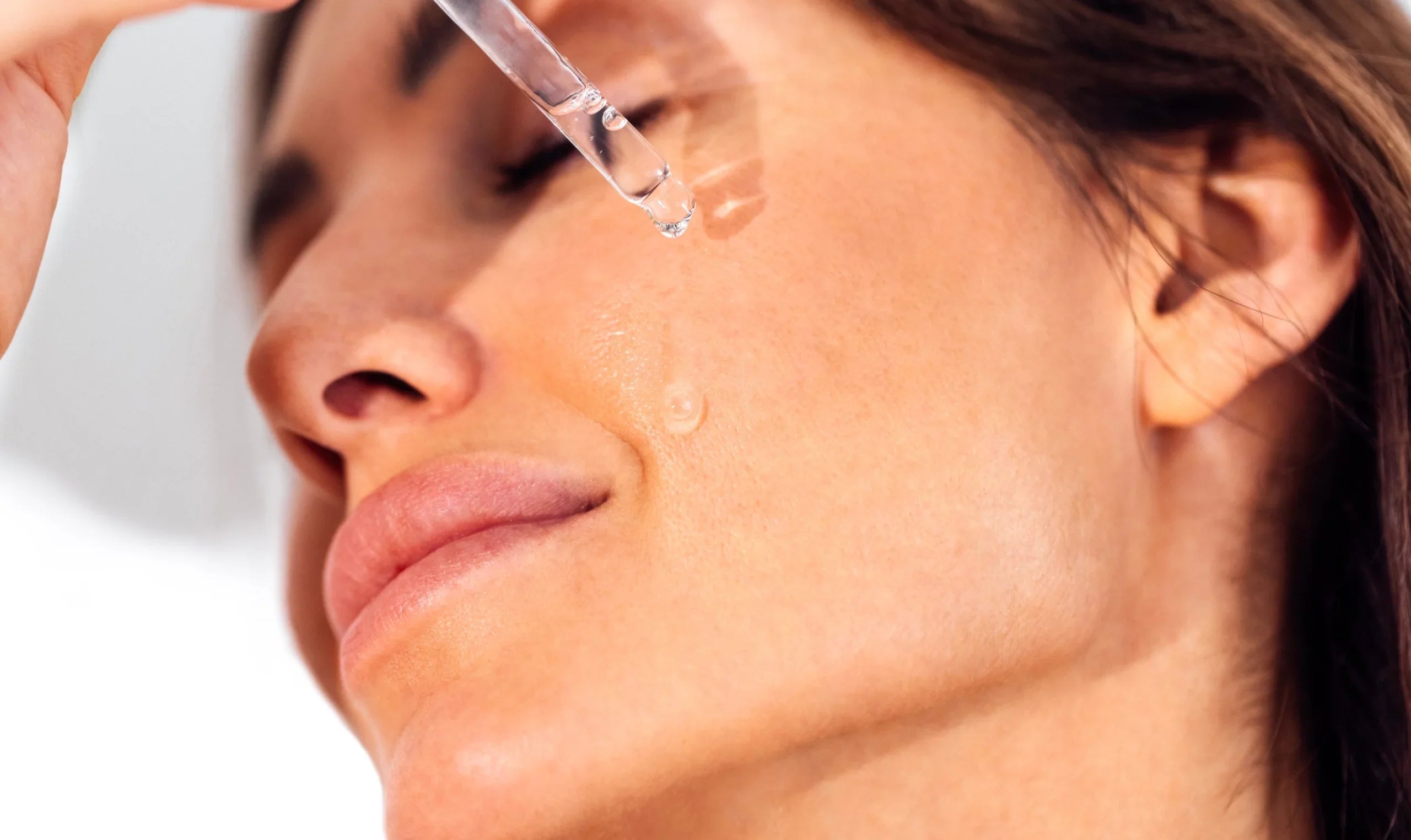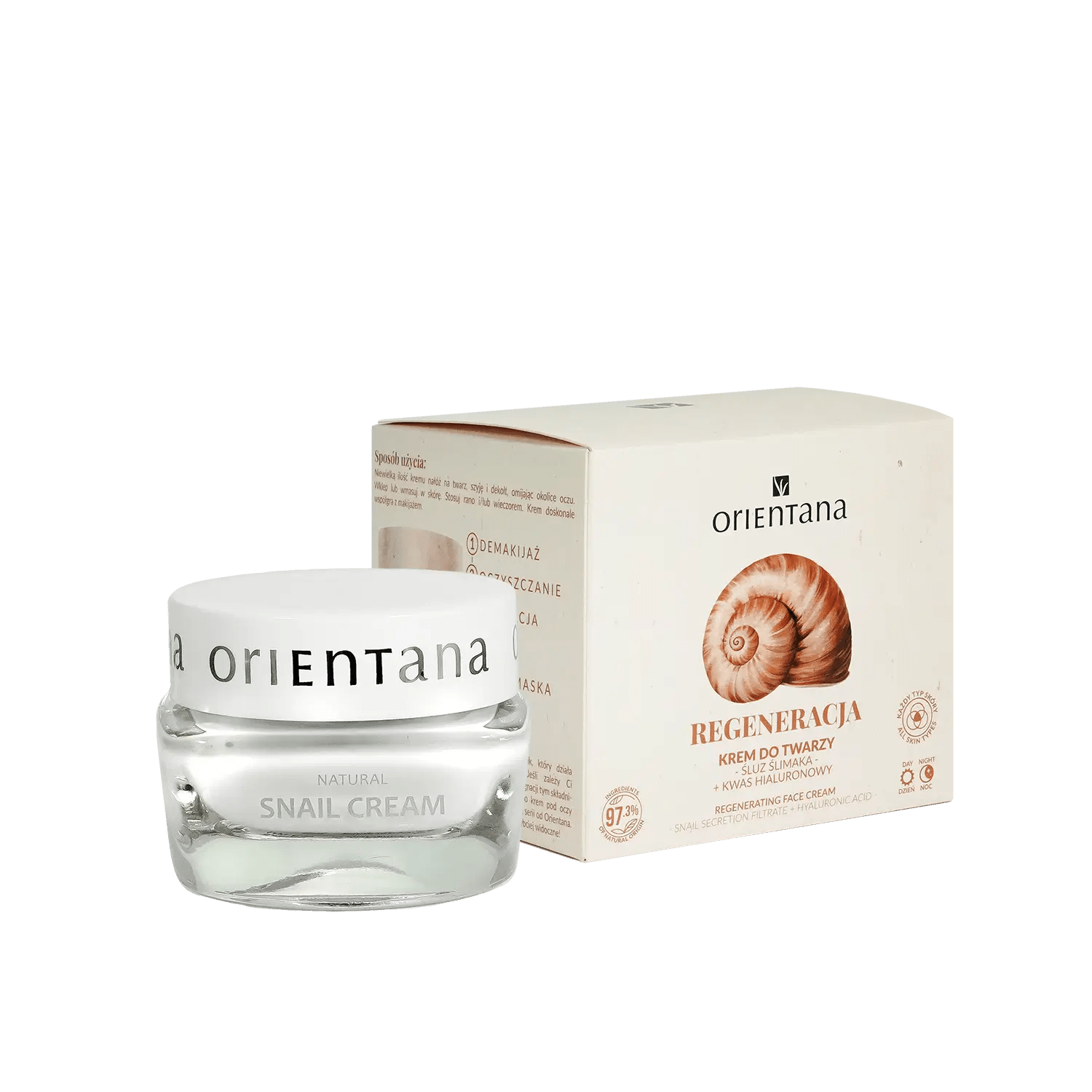Have you heard about the effects of synergy in cosmetics? Synergy occurs when the combination of two substances gives better results than using them separately. The ingredients then work in a complementary way, strengthening their properties. This is how peptides and Coenzyme Q10 work, which we have enclosed in our latest cosmetic - Serum-Ampoule BRIGHTENING.
Coenzyme Q10 and Peptides – why Orientana combined these two ingredients
Combining peptides with coenzyme Q10 (ubiquinone) in cosmetics is considered extremely beneficial. Both of these ingredients offer complementary benefits for the skin, and their action is even more effective when combined. When both of these ingredients are used together, they can jointly counteract the signs of aging: peptides improve skin structure, and coenzyme Q10 protects cells from oxidative stress and supports their regeneration. Both ingredients work in different mechanisms and do not compete for the same biochemical pathways. Therefore, combining peptides with coenzyme Q10 in one formulation is a solution for people looking for comprehensive anti-aging care. Both of these ingredients can be used simultaneously, reinforcing each other's action without the risk of interaction.
Benefits in the Serum Ampoule resulting from the combination of peptides and coenzyme Q10
Anti-aging effect
Peptides: Peptides are short chains of amino acids that signal skin cells to produce more collagen, elastin and other structural proteins. They help smooth wrinkles and improve skin firmness and elasticity.
Coenzyme Q10: Coenzyme Q10 is a powerful antioxidant that protects the skin from oxidative damage caused by UV radiation and other environmental factors. It also works at the cellular level, supporting energy production (ATP), which is crucial for skin regeneration and repair.
Improving the skin's barrier function
Peptides support the regeneration of the skin's protective barrier, and coenzyme Q10, thanks to its antioxidant properties, helps maintain a healthy level of moisture by protecting the lipids of the stratum corneum from oxidation.
Protection against photoaging
Coenzyme Q10 protects skin cells from UV damage. Peptides, in turn, stimulate the rebuilding of damaged collagen, which helps the skin fight photoaging. Studies suggest that Q10 can reduce the depth of wrinkles and improve the overall smoothness of the skin.
Coenzyme Q10
Coenzyme Q10 is often a component of anti-aging cosmetics, creams and serums that are designed to support skin regeneration, moisturize and protect against aging.
Coenzyme Q10 - what is it exactly?
Coenzyme Q10 (ubiquinone) is a naturally occurring chemical compound that plays a key role in cellular energy production. Coenzyme Q10 is a substance that occurs naturally in the body and plays a key role in cellular energy production and as a powerful antioxidant that protects cells from damage caused by free radicals. It is responsible for transferring electrons in the respiratory chain in mitochondria, which allows energy to be produced in the form of ATP. Coenzyme Q10 is also a powerful antioxidant, meaning it "saves" the skin from aging. Skin Q10 levels refer to the concentration of coenzyme Q10 (ubiquinone) in the skin. Coenzyme Q10 is a substance that occurs naturally in the body and plays a key role in cellular energy production and as a powerful antioxidant that protects cells from damage caused by free radicals.
Coenzyme Q10 - effect on the skin
Energy production: Q10 is essential for metabolic processes, especially in mitochondria, where it supports the production of energy in the form of ATP. This energy is crucial for the regeneration and proper functioning of skin cells.
Antioxidant: Protects skin from oxidative stress, which is one of the main causes of skin aging. Free radicals can lead to damage to collagen, elastin and other skin structures, which contributes to the appearance of wrinkles and loss of firmness over time.
Slowing down aging: As we age, Q10 levels in our skin decline, which can lead to a weakened ability for skin to regenerate, increased susceptibility to damage and visible signs of aging.
PEPTIDES - a brief description
Peptides are valued ingredients in skin care due to their ability to support regenerative processes, moisturization and anti-wrinkle effects.
PEPTIDES - WHAT IS IT?
Peptides are short chains of amino acids that are the building blocks of proteins such as collagen, elastin, and keratin – key structural components of the skin. Due to their structure, peptides perform a variety of biological functions, including an important role in skin care.
Peptides are widely used in face and eye serums, and their spectacular effects can be observed especially when using Reishi Eye and Eyelid Serum . They can also be found in face creams and masks. Their regular use can lead to improved skin elasticity, reduced visibility of wrinkles and overall improvement of skin condition.
Peptides - effects on the skin
Stimulates collagen production: As we age, our natural collagen production decreases, leading to wrinkles and loss of firmness. Peptides can signal skin cells to increase collagen production, promoting skin rejuvenation and wrinkle reduction.
Improved elasticity and firmness: Peptides also support the synthesis of elastin, which affects the elasticity of the skin. This makes the skin firmer and less prone to sagging.
Anti-wrinkle effect: Some peptides (e.g. neurotransmitter peptides) work on the principle of muscle relaxation, similar to botulinum toxin, which helps to smooth out facial wrinkles. This makes the skin look smoother and younger.
Accelerate regenerative processes: Peptides can stimulate the repair processes in the skin, which promotes the healing of minor damage and scars. They also help regenerate skin cells and support natural repair mechanisms.
Strengthens the skin's protective barrier: Some peptides help strengthen the skin's hydrolipid barrier, which is crucial for maintaining hydration and protection against external factors such as pollution and UV radiation.
Skin hydration: Peptides support water binding processes in the epidermis, which helps to improve skin hydration, making it softer and more elastic.
Sources:
Wang Y, Sun Z, Wang W. Peptides in cosmetics: anti-aging effects and underlying mechanisms . Int J Mol Sci. 2021;22(1):386.
Kwon S, Bae H, Park J. Bioactive peptides from natural resources and therapeutic applications for tissue engineering . Theranostics. 2022;12(2):648-669.
Dong J, Li Y, Wu C. Mechanisms and applications of bioactive peptides against skin aging . J Cosmet Dermatol. 2020;19(9):2285-2291.
Zmitek J, Sikorska E, Zmitek K, Ostrovidov S. Coenzyme Q10 – its role in the skin . Biomolecules. 2020;10(3):376.
Hoppe U, Bergemann J, Diembeck W, et al. Coenzyme Q10, a cutaneous antioxidant and energizer . Biofactors. 1999;9(2-4):371-378.



![Prezent dla Dziadka - pomysły, które naprawdę ucieszą [2026]](http://orientana.pl/cdn/shop/articles/prezent-dla-dziadka-kosmetyki-orientana_1236b498-20ac-42f5-a1cf-9dbb53180656.webp?v=1768157329&width=1100)


